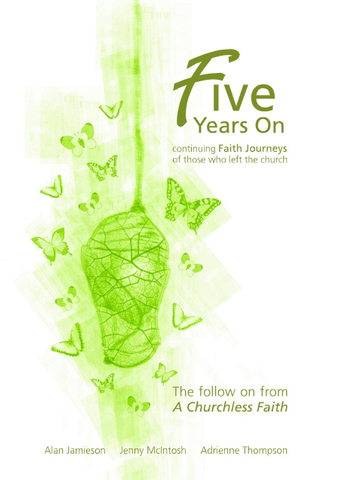Five Years On: Continuing faith journey's
of those who have left the church
by Alan Jamieson, Jenny McIntosh, Adrienne Thompson
Published in
Five Years On continues the work begun in A
Churchless Faith by returning to the same group of church leavers five years
after first interviewing them. The findings show how their personal faith and
connection with ‘church' has changed over a five-year period. To these accounts
are added insights from six years of running Spirited Exchanges groups for
church leavers and those struggling with ‘church' focused expressions of the
Christian faith. The findings may shock.
Dr Chris Marshall (
“This follow-up to A Churchless Faith is
both fascinating and disquieting – fascinating because it shows that people
rarely stand still in their journey of faith, whether or not they attend
church. And disquieting because it underscores once again just how irrelevant
or unhelpful the institutional church has become for so many reflective and
intelligent believers today. This book provides further valuable insights into
the growing phenomenon of church leavers, whose protest the church ignores at
its own peril”
In the foreword Alan writes: “If Barna [see
his book, Revolution] and other Christian commentators are even remotely right
then it is crucial we come to understand church leavers and their continued
journeys of faith in order to prepare for the new realities of a fundamentally
different spiritual landscape.”
It seems to me that from a church
perspective (and here I'm thinking of what Alan refers to as the “established
church” [he defines it in the book]) there is something potentially (but
certainly not always) ‘prophetic' in and amongst the stories of church leavers
who have continued their Christian faith journeys in spite of, and apart from,
established ways of being church.
So, in what sense am I using the term
‘prophetic' when talking about church leavers and a book like Five Years On?
Prophetic, firstly in the sense of leavers,
their stories and their experiences calling the church back to something that
it has lost or forgotten; something about its relationship with God and its
radical identity as the people of that God which seems to leavers to be
missing.
Secondly, I'm using it in terms of a
“summons,” a calling to the church to become more than it currently is in a
significantly changed cultural milieu, more than it has allowed itself to
settle for.
This is a clear sense that I get when I
hear Alan talk of “church leavers” as being crucial in terms of “the new
realities of a fundamentally different spiritual landscape.” There is a clear
sense of a need for conversation, for pastoral listening, and for discerning
what it is that the Spirit might be saying to the church. Part 2 will resource
both pastoral and leadership reflection, and in a more general sense, networks
of conversation within and without church congregations.
The book is a good balance of research, the
voices of those they interviewed and the authors own stories, insights, and
experience. I think the collaborative / “specialist” (if I can use that word)
approach to writing this book is an inspired and certainly, tongue in cheek, a
very trinitarian one. It works well and is particularly to the fore in Part 3
where Jenny, Adrienne and Alan “respond” to church leavers from the perspective
of Spirited Exchanges, a spiritual director, and a pastor. All three give ideas
around what their respective roles offer as they accompany church leavers and
those struggling with deep and oftentimes painful questions and experiences
around faith, church belonging, God, church abuse, doubt etc. Much in evidence
and woven through the text is a real humility, wisdom, and warmth of
humanity.             Â
Paul Fromont

